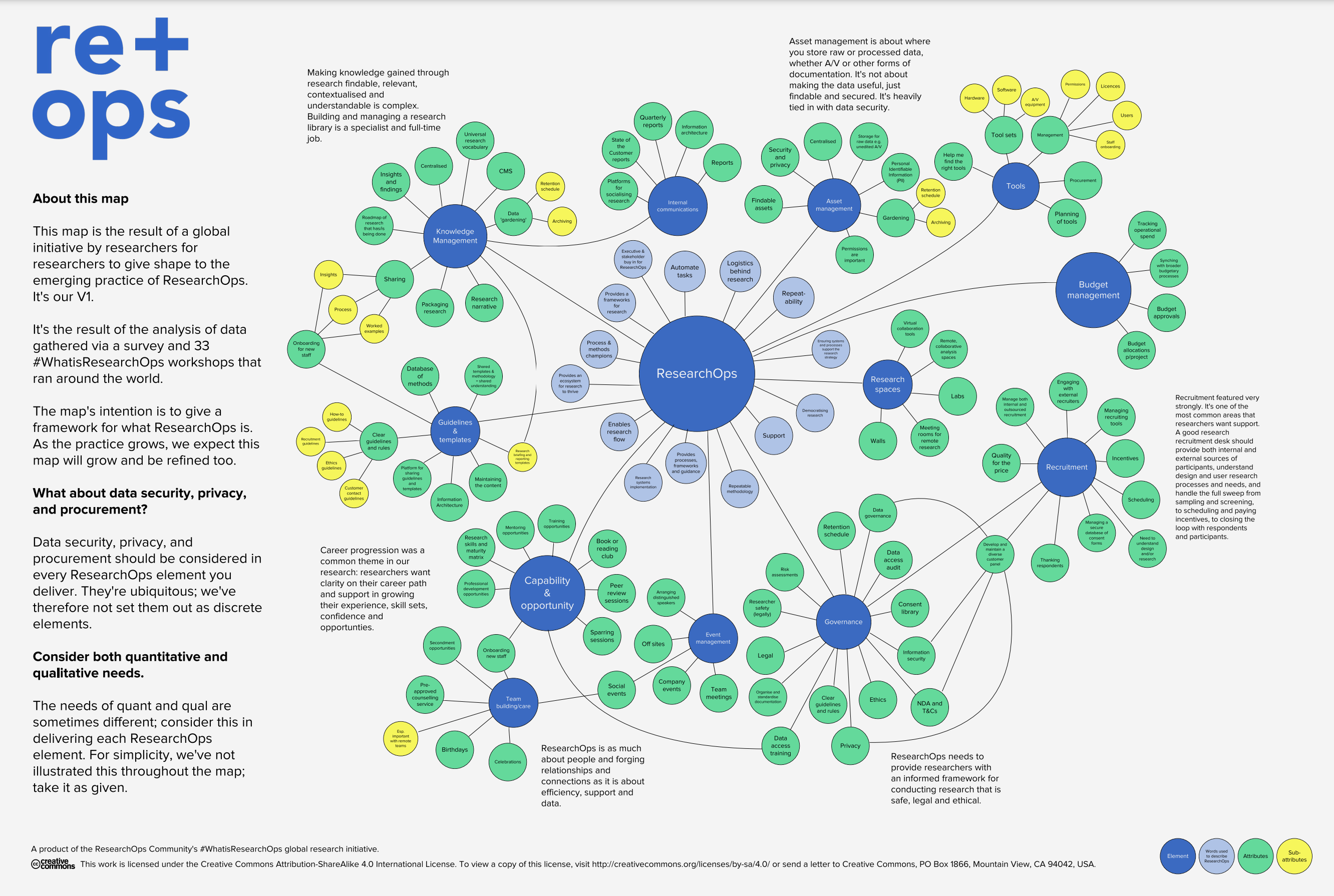Research Ops
What is Research Ops: The Complete Guide to UX Research Ops

Written by: Phil Hesketh
Published on: Last updated:
The term and the role of research ops encompasses everything that's needed to set a user research project in motion.
Learn everything there is about research ops, and find out how to create a research ops program within your organization.
What is Research Ops?
Research Operations (also known as Research Ops, or ReOps) is an emerging field, and one that is rapidly being adopted by companies who rely on UX research to grow their business.
As described by the ResearchOps Community:
“ResearchOps is the people, mechanisms, and strategies that set user research in motion. It provides the roles, tools and processes needed to support researchers in delivering and scaling the impact of the craft across an organization”
The community also created the visual framework below, which defines the elements of Research Ops to help shape this emerging practice.

Image source: ResearchOps Community
A ReOps program manages both the people, roles, tools, and processes that carry out user research. It can function alongside other similar operations teams, such as DevOps and Design Ops.
Kate Towsey, Research Ops Manager at Atlassian defines it as:
“Offering support and infrastructure to ‘people who do research’. This is because in a lot of bigger organizations like Atlassian, it’s not just researchers doing research, there’s also PMs and designers doing research”
User research has, up until recently, been a part of a UX designer role. But organizations have realized the impact of quality research on their growth, and now have teams dedicated solely to the pursuit of UX research.
As these teams scale, it becomes difficult to manage the people, tools, costs, and processes involved in UX research, which is how the role of Research Ops evolved.
Research Ops enables busy UX researchers to plan, conduct, report on, and apply the findings of their research at scale—while at the same time improving their productivity and helping them to overcome the many roadblocks and challenges they face in their daily work.
So if you’re looking for a way to identify opportunities to grow, improve efficiency, and make faster and better informed business decisions, creating a Research Ops program to support your UX researchers can help you reach these goals faster.
What are the benefits of Research Ops?
Although Research Ops is still in its infancy, it’s a powerful advantage for growing businesses who want to scale their research initiatives (and keep their UX researchers sane).
UX as a discipline has grown exponentially around the world since the 1950s. The Nielsen Norman Group predicts that there will be over 100,000,000 UX professionals by 2050.
So with more companies getting on board with UX research, and more people choosing UX research as a career, finding ways to scale research practices to ensure high quality research and keep up with demand is essential. And that’s where Research Ops comes in.
The key benefits of implementing a ReOps program for your business include:
Efficiency
Your UX researchers will be able to breathe a huge sigh of relief once Research Ops is up and running.
With the support of this program, researchers can focus directly on the tasks that move the needle to enhance user experience. They’ll also reach their goals faster and be able to maintain higher research standards.
A ReOps team will analyze all of your current research processes, create operational strategies to ensure that future research is more efficient and consistent, and help to action those steps.
This can significantly reduce repetitive admin tasks, save time, and create smooth, efficient, and repeatable processes for your researchers.
Compliance
The growing and changing global laws around data consent and compliance means many organizations could find themselves in a sticky legal situation if they don’t have systems in place for managing personal data.
A Research Ops program can give you peace of mind by ensuring that research teams aren’t overlooking consent and compliance.
Appointing somebody who is responsible for creating processes and workflows to ensure you’re adhering to rules and regulations like GDPR and CPRA means you’ll significantly reduce your risk of non-compliance.
Cost savings
Tired of having those awkward conversations about budget blowouts?
UX Research Ops can streamline all the moving parts of your research studies, and eliminate many of the software tools and expenses that are dragging you down.
As part of your Research Ops program, you should ensure you have a manager who is:
Responsible for approving research-related expenses
Able to establish that any current paid software tools are worthwhile
Able to source the most cost-friendly hardware and software items for your use cases
Customer experience
Your business can use Research Ops as a means to get deeper research insights on customers, action their feedback, and enhance the user experience.
Decision making
UX research teams often collect data that isn’t accessible to other teams in your organization, and may be stored in many different places. The same goes for data collected by your sales, marketing, and products teams.
ReOps can collate and manage all of this data and keep it in a central location. This ensures your organization has the information it needs on demand to inform decision making and achieve company goals in the most efficient way.
Stakeholder buy-in
Many UX teams can’t (or don’t know how to) accurately measure the performance of their research initiatives, which makes it tricky to get executives to buy into future research rounds.
ReOps can help create standardized systems for things like:
Deciding which metrics need to be captured
How to apply these metrics to business goals
Consistent data collection and reporting
A Research Ops program can help gather historical data and deliver all the juicy metrics that stakeholders want to see to sign off on new research—and (hopefully!) approve the budget that will be needed to deliver an excellent outcome.
Brand building
Research Ops can help you make key decisions that align with your goals and values as a brand, which can lead to a stronger brand reputation, better user experience, and increased customer loyalty.
UX research advocacy
Your Research Ops team should love what they do—as they will play a key role in your organization to share information and advocate for the value and importance of UX research, and the many powerful advantages it gives your business.
They will help to socialize and democratize your research so that teams across your organization can access information, collaborate on initiatives, and make more informed decisions based on research insights.
How to create and implement a Research Ops program
If your company is undertaking more UX research, and your research team is expanding, you’ll need to start thinking about ways to operationalize research as your business scales.
Research requires a lot of additional work outside of the actual research bit, including preparing an initial brief, managing participants, analysis, reporting…and the list goes on.
If you find that your UX researchers are spending less and less time on actual research work, it’s time to consider implementing Research Ops to keep things organized, and to give your UX team the support they need to do their best work.
Here’s a simple Research Ops framework to help you get started.
1. Appoint a manager for your Research Ops program
Your starting point is to choose the right person to manage things like workflows, data control, and budget. They’ll need to create systems and guides that can be rolled out across your organization.
This person should ideally have plenty of experience with:
UX planning, research, project management, and reporting
Creating and managing budgets
Leading and management teams
Liaising with various teams and communicating with stakeholders at executive levels
2. Decide what Research Ops will be responsible for
When you’re considering Research Ops for your organization, you’ll need to begin by pinpointing the biggest problems and roadblocks faced by your UX research team. These should guide how your Research Ops program operates.
For most companies, the UX research team’s pain points will take the form of admin tasks that are tying up all their time and slowing their progress.
Talk with your researchers and ask them which specific tasks and processes they’d love to hand over to someone else so they can concentrate on what they’re best at.
These jobs can be dealt with more efficiently and effectively by a dedicated Research Ops team, who can focus on:
Governance
ReOps will do the heavy lifting for data governance, and for creating ethical guidelines around data and consent management for your company.
This includes data collection, storage, and processing, and ensuring sensitive personal information is compliant with all relevant rules and legislation.
Knowledge management
As your business scales and your UX research initiatives increase, you need to have scalable systems in place for capturing research data, analyzing it, sharing it, and archiving it.
Research Ops are usually responsible for knowledge management, and for ensuring data is stored in a centralized place that is secure, compliant, and accessible to whoever needs it.
Participant management
Recruiting participants can be one of the most time-consuming tasks for UX researchers. And it’s one of the key tasks that Research Ops can easily take off their hands.
Your ReOps team can manage all the complex needs of participant recruitment, including:
Building a database or research panel of potential participants
Researching recruitment channels
Defining ideal participants
Recruiting participants for field studies, surveys, and interviews
Screening participants
Managing communication and data throughout the participant lifecycle
Booking venues
Collecting and analyzing data
Gathering and reporting on insights
Creating frameworks for fair and ethical incentives for participants
Managing the necessary budgets for recruitment
Hardware and software management
Depending on the type of research carried out by your organization, your Research Ops team might be responsible for:
Booking appropriate venues for conducting research
Sourcing audio or recording equipment
Finding lab space
Using specialized software to analyze data
Whatever your teams require to ensure a successful research study, it’s Research Ops’ job to ensure they have what they need, when they need it.
Documentation creation and management
As we mentioned earlier, Research Ops is all about improving efficiency. If your UX research is scaling, you need templates, processes, guides, and manuals to ensure that everyone is on the same page, and is producing work that’s consistent and of high quality.
In most organizations, it’s Research Ops who are in charge of creating and updating these documents.
Training and support
ReOps should also be in charge of producing documents, guides, and templates that help to train and upskill researchers. They might work on creating specific trainings for things like:
Ensuring ethics are applied and upheld by individual researchers
Standardizing your organization’s research methods
Consent forms, consent management, types of consent
Data governance
Recruiting participants
Customer contact guides
It might also be beneficial to let your Research Ops team support research managers by:
Pinpointing new opportunities for coaching and training
Screening and onboarding new research hires
Streamlining internal and offsite meetings
Educating research partners and stakeholders about the value of UX research
Making sure research data and success stories are accessible to people who need it
Ensuring the impact of your UX research is understood across your organization
Internal communications
Depending on the size of your organization, your Research Ops team might be responsible for tasks such as:
Communicating with other departments and stakeholders about research
Internal communications
Content production (e.g. blogs and newsletters)
Budget management
You can hand over some budgeting responsibilities to Research Ops too. These can include items such as allocating budget for research studies, tracking spend, and allocating resources for research projects.
Research Ops will also be in charge of negotiations when it’s time to get budgets approved for research studies and participant incentives.
3. Create standardized workflows
Once you’ve decided what your Research Ops team will be responsible for in your organization, you’ll need to create a standardized workflow for their respective activities.
Decide how you can:
Automate repetitive and time consuming tasks
Delegate specific tasks to team members
Create templates and how-to guides to save time
You’ll then need to set an achievable timeframe to complete these workflows and nail down your new Research Ops processes.
Decide on essential tools
Research Ops teams typically rely on a multitude of hardware and software tools to get work done efficiently.
When you’re developing your ReOps program, you’ll need to consider the types of tools you might need for things like compliance, project management, data collection, and reporting—and the budget you have for these essential tools each month.
Depending on your organization, you might need software to help manage:
Team communication
Collaboration
Projects
Scheduling
Polling and surveys
Interviews
Recording equipment for audio and/or video
Transcription
Mockups and prototypes
Design collaboration
User journey mapping
Reporting
Budgeting
Data analytics and tracking
As you can see, this is a fairly lengthy list—and these only scratch the surface of the potential tools that your team might need.
It’s important to set a firm budget, and then narrow down the must-have and nice-to-have tools to help you launch your Research Ops program.
5. Take action
Once all of your Research Ops people and processes are in place, it’s time to put everything into action.
Create an action plan that sets out each step you’ll be taking to increase efficiency and improve specific parts of the research process. It’s important to place an initial focus on the things that will give you the best shot at scaling the impact for your research team—and for your customers.
Make sure you include a timeline for your plan, and an approximate budget for working through everything.
It’s important to track all of the changes and results (good and bad) so your ReOps team can iterate and improve upon their systems over time.
6. Measure results
One of Research Ops’ key roles is to be able to provide relevant metrics that can be tied to both specific and overall business goals.
They can use these results at stakeholder meetings, to get buy-in for new research studies, and to help organizations make smarter business decisions.
What qualities do you need as an individual to succeed in Research Ops?
Research Ops involves tasks like recruiting people for interviews and surveys, scheduling research, creating research processes and programs, and undertaking various other admin tasks to help deliver better results for companies.
It’s a career path that is ideal for a variety of people. As it’s still an emerging discipline, you don’t need to have any specialized experience to get started—but it will be beneficial if you have a background in general business operations, UX, marketing, or research.
If you’re thinking of getting involved in Research Ops, here are some of the key qualities you’ll need to succeed in this role:
Attention to detail
You’ll be reviewing and analyzing large amounts of data on a regular basis. This means you’ll need to enjoy working your way through a ton of information and be able to spot trends and patterns.
Analytical skills
You’ll need to have natural analytical thinking skills to help you process research data, and draw meaningful conclusions from it.
Critical and creative thinking
Being a good problem solver is essential. Can you think on your feet and come up with creative solutions to complex problems? If so, you could be a great fit for this role.
Communication
You’ll need to be able to effectively communicate with others, and be able to clearly explain your research findings and solutions to stakeholders and other team members.
Organizational skills
By its very nature, this job demands that you’re efficient and organized in both your thinking and your actions in order to meet deadlines and stay on budget.
If you tick all of these boxes, Research Ops might be the perfect career move for you!
Wrapping up
As companies increasingly rely on UX research operations to grow, there is an overarching need for Research Ops to help organize, deliver, and scale these initiatives.
If you’re interested in learning more, check out the ResearchOps Community. It’s a global group that has a ton of helpful resources, plus an active Slack channel where you can network with other experts in this field.



